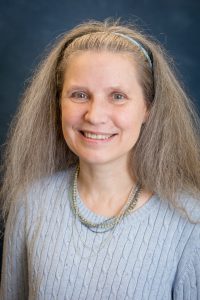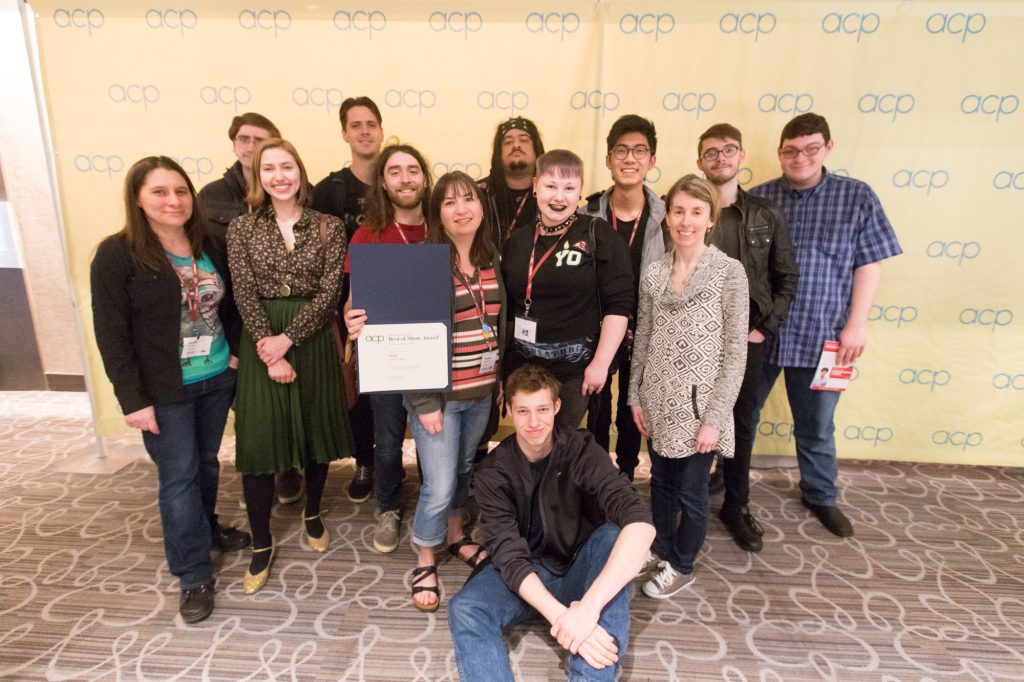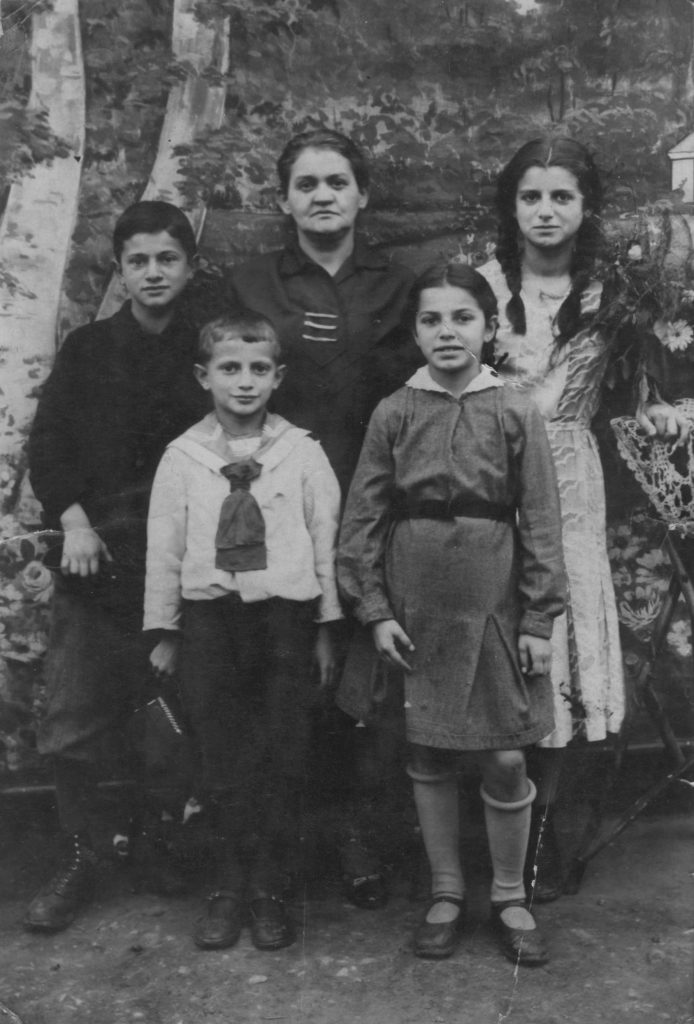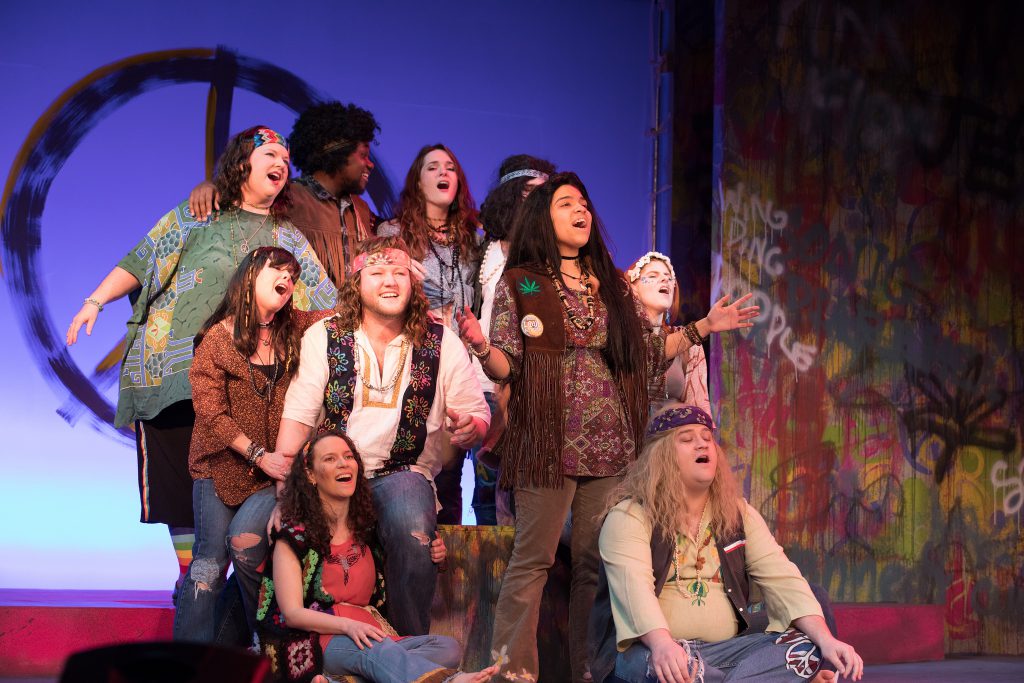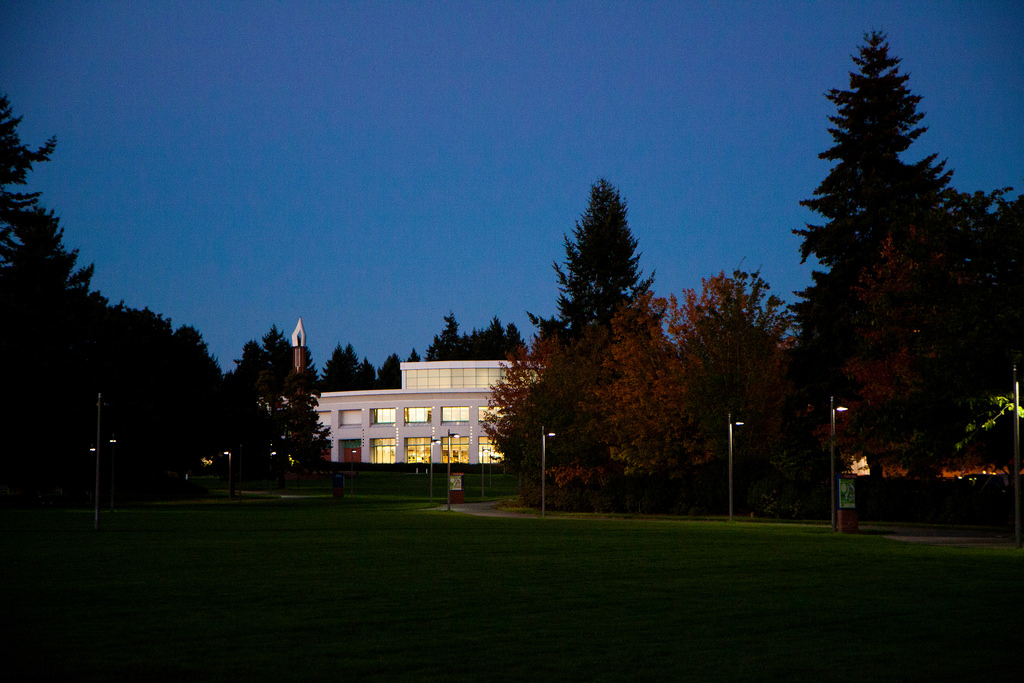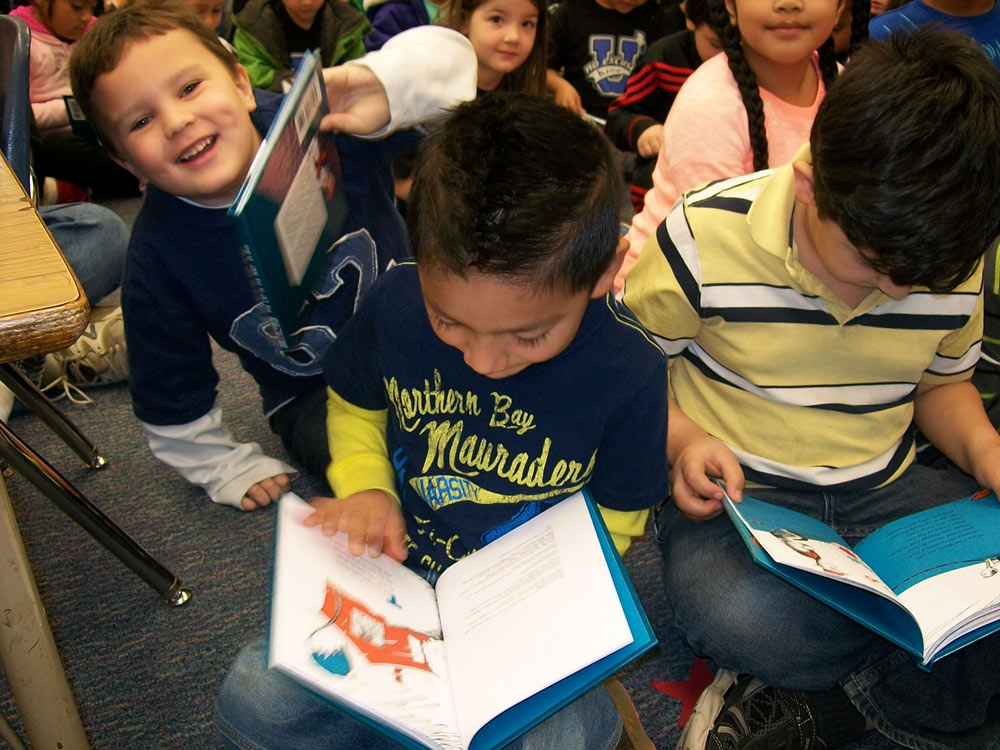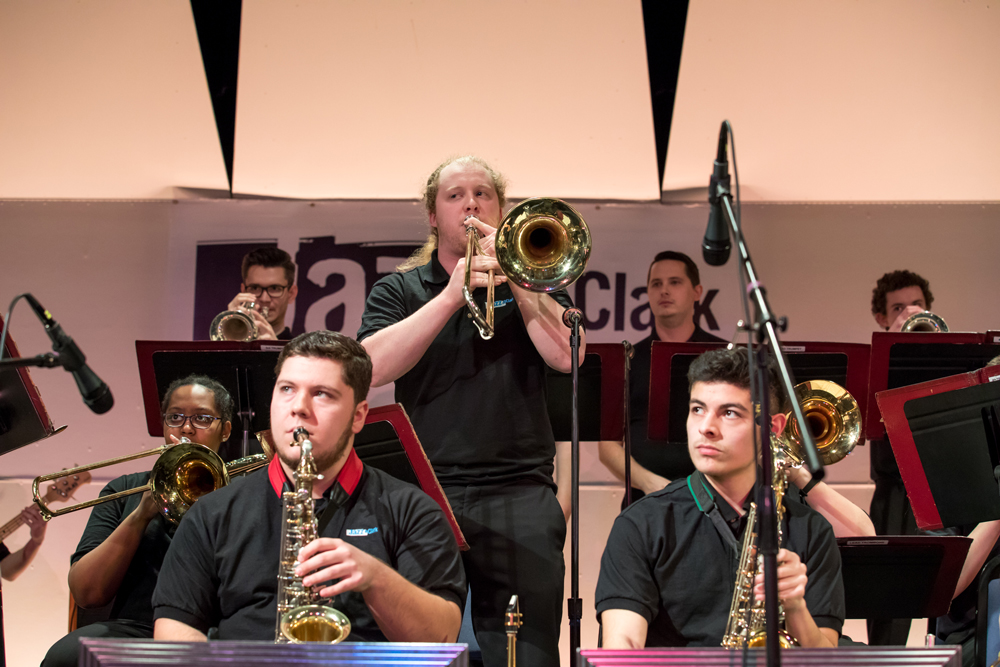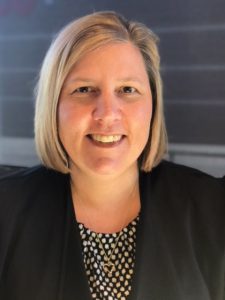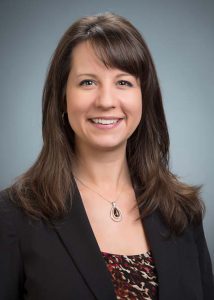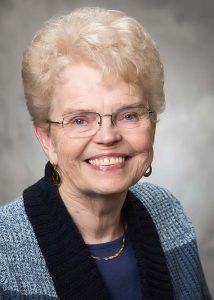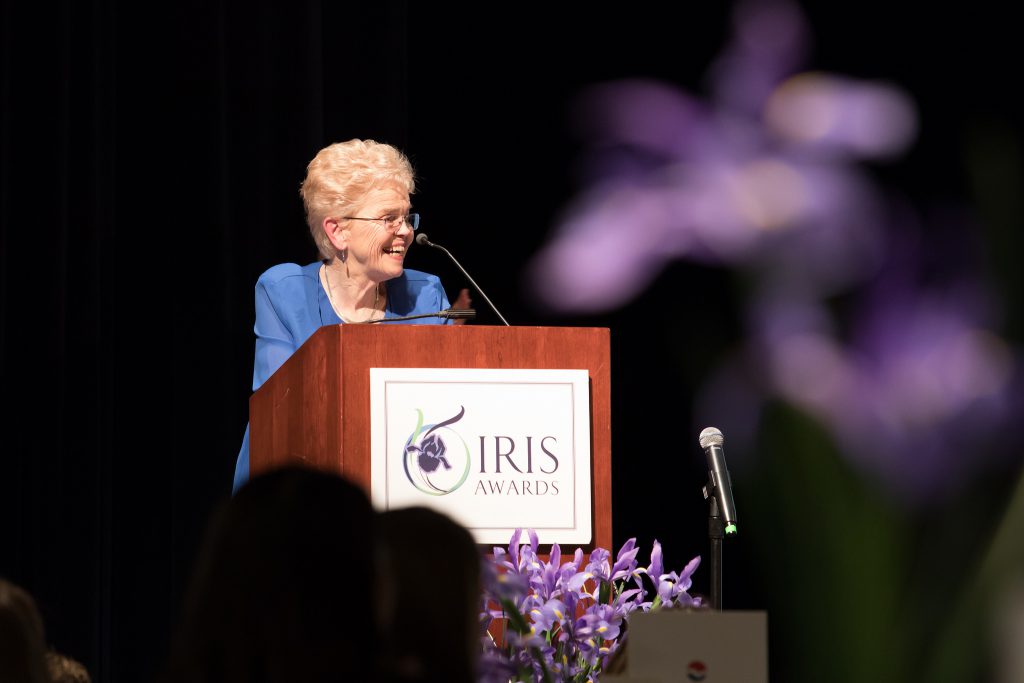
Nan Henriksen at the 2018 Iris Awards.
On March 8, while people around the world celebrated International Women’s Day, members of the local community gathered in Gaiser Student Center to honor four women’s contributions to Southwest Washington at the 2018 Iris Awards.
Guests enjoyed refreshments and light fare provided by Beaches Restaurant as they celebrated the honorees. Ceremonies began with a greeting from Clark College President Bob Knight, after which the evening was turned over to emcee Kelly Love, public and community affairs representative at Legacy Salmon Creek Medical Center. Love introduced speeches by both the honorees and their nominators.
This year’s Iris Award recipients were:
- Julie Bocanegra of Columbia Credit Union
- Juliana Marler of the Port of Vancouver
- Nancy Retsinas of the Retsinas Collaborative Law Center
- Nan Henriksen, former Mayor of Camas and chair of the Clark County Board of Freeholders
This annual ceremony has a long tradition in this community. The event began in 1985 as a photography exhibit during Women’s History Week, which later developed into a larger awards program and ceremony known as the Southwest Washington Women of Achievement Awards. In 2012, the event was reintroduced as the Iris Awards with the same core mission: honoring the women of Southwest Washington for their outstanding contributions in the categories of public, private, philanthropic, and civic service.
The 2018 Iris Award Recipients
Julie Bocanegra
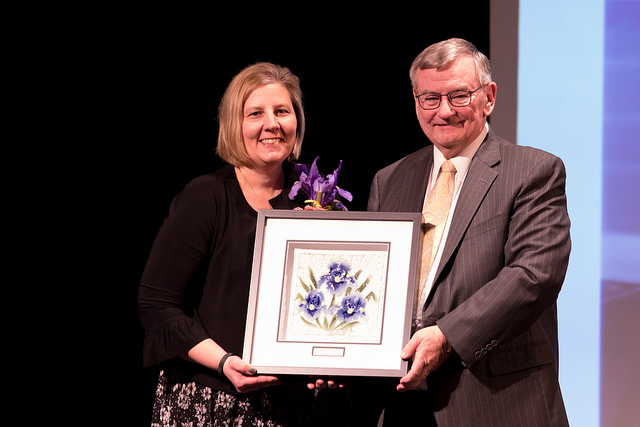
Julie Bocanegra accepts her 2018 Iris Award from John Deeder.
The first honoree to take the stage was Julie Bocanegra, Vice President and Branch Manager for Columbia Credit Union, where she began her career as a teller in 1994. Since 2012, she has also served on the Evergreen School District Board of Directors, where she has been instrumental in leading the district’s student equity and technology learning initiatives. She is also the former Board Chair of the Battle Ground Chamber of Commerce and is the former Board President for Evergreen Little League, along with many other volunteer commitments.
“She will volunteer till the cows come home because she wants this to be the best community in the world,” said recently retired Evergreen superintendent John Deeder, who nominated Bocanegra for the award and introduced her during the ceremony. “And because of people like Julie, I believe that it is.”
Bocanegra smiled as she took the podium, noting that this night reminded her of her first job as a teenager, sorting and packing flower bulbs and tubers, including those of irises. As a teenager, she said, she would never have imagined that one day she would be receiving an award named after that flower for her contributions to the community.
Bocanegra went on to describe her life’s unexpected trajectory, from a recent high school graduate trying to find her purpose to a bank teller to her current leadership position. Similarly, she recounted how a decision to coach her son’s Little League team led to greater and greater volunteer roles within her community, often focused around youth and education.
“What we want for our own children, we have to want for every child in our community,” she said.
Julianna Marler
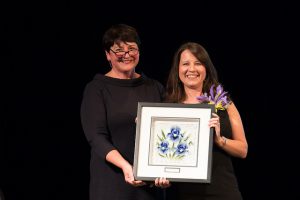
Julianna Marler, right accepts her 2018 Iris Award from Lisa Lowe.
Next, an award was presented to Julianna Marler, the CEO of the Port of Vancouver USA. Marler is the first female CEO in the port’s 105-year history and one of just a handful of female port CEOs in the United States. In addition to her leadership role at the port, Marler serves on the Greater Vancouver Chamber of Commerce Board of Directors, Great Portland Inc. Board of Directors, American Association of Port Authorities Board of Directors, and the Washington State University Vancouver Advisory Council.
“She has given women at the port a sense of pride and let them know that they can rise into position of leadership there,” said Lisa Lowe of the law firm Schwabe, Williamson & Wyatt in introducing Marler. (Lowe was herself a 2013 Iris Award honoree.) “She applies a sense of humor to things that is intelligent and not always respectful—which is probably why I like her.”
Marler began her remarks by traveling back in time even farther than Bocanegra did. “Fifty years ago today, on March 8, 1968, my parents—who are here with me tonight—immigrated to the United States,” she noted. “They left Hungary because they wanted a better life and education for their children.”
Marler noted that the port is an important source of jobs and commerce in the region, and expressed pride in its vital place in Southwest Washington’s economy. “Fifty year ago today, my parents came to this country to provide a better future for their children, and today I get to be part of creating a better future for others,” she said.
Nancy Retsinas

Nancy Retsinas at the 2018 Iris Awards.
Nancy Retsinas was also introduced by a former Iris Award recipient, Lisa Schauer of PointNorth Consulting.
“Nancy has transformed the legal profession, aligning her practice to her values,” said Schauer.
Retsinas is a collaborative lawyer and family law mediator in Washington and Oregon, in private practice since 1991. She is co-founder and executive director of the Two River Institute for Dispute Resolution, a nonprofit educational organization. Retsinas currently serves as Northwest regional chair of the Global Collaborative Law Council, board treasurer of the Collaborative Professionals of Washington, board president for Cappella Romana Choral Ensemble, and board director for the Children’s Center.
Retsinas began her remarks by noting that she, like both Bocanegra and Marler, had attended Clark herself, and so “this place has always felt like home to me, so it’s really special to be receiving this award here.”
She went on to describe the arc of her career, which began in courtrooms doing traditional, adversarial law. “To swoop into court to defend the innocent or maligned—that felt pretty good,” Retsinas said, but added that eventually she became uncomfortable with this model of legal practice and “set out to find my superpower, so to speak.”
Through working with nonprofits, Retsinas said, she began to realize her purpose: to change the culture of conflict resolution in Southwest Washington. And, she added, she discovered that “true power lies in finding your purpose and expressing it to the world.”
Retsinas said that her current work at the Retsinas Collaborative Law Center, which she founded in 2015, allows her to do just that. And she offered this advice to young women in the audience: “Trust your gut, discover your own superpowers, harness them for good, and achieve your purpose.”
Nan Henriksen

Nan Henriksen accepts the 2018 Iris Legacy Award from Judie Stanton.
The final honoree of the evening, Nan Henriksen, was no stranger to awards ceremonies. Indeed, she had received a Women of Achievement Award (the original name of the Iris Awards) in 1995, and tonight was receiving the Legacy Award, bestowed on a previous awardee who has continued to make significant contributions to her community. Henriksen certainly qualifies: The former Camas mayor recently came out of retirement to lead the Clark County Freeholder Board formed to create the county’s first home-rule charter.
“She hasn’t slowed down a bit, probably because she gets up every day at 5:15,” said her friend Judie Stanton, herself the 2017 Legacy Award recipient. “She gets a lot done.”
Henriksen received the award with grace and humor, noting that she’d tried to force herself to start writing an inspirational speech for the evening, but instead became intimidated by the task and “ate my weight in popcorn and played solitaire on my phone for two hours.” Henriksen then pointed out the larger moral of that story: “Those of us working out in the community, we do the things we do in spite of these fears of inadequacy, not because we don’t have them.”
Henriksen also noted that people can contribute to the community in many different ways. While Henriksen is probably most known for her work in leading Camas through a difficult economic transition as one of its major employers began to shut down, she said that one of the accomplishments she is most proud of is becoming a foster grandmother to a girl who went on to successfully enter college.
“You can do it on a bigger scale or on a smaller scale,” she said. “What’s important is that you decide, ‘If I care enough and I’m brave enough, I can make a difference.’”
Photos: Clark College/Jenny Shadley. To see more photos from this event, visit our Flickr album.
This article was updated March 29, 2018, to correct Lisa Schauer’s current position and to include a link for more photos.


